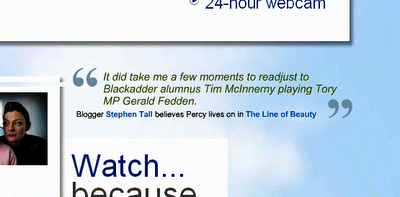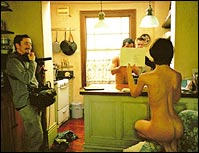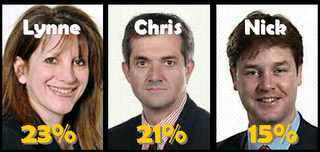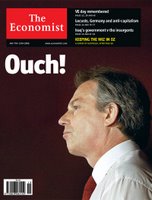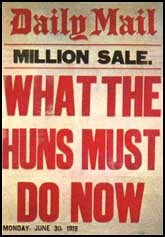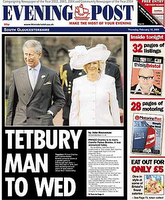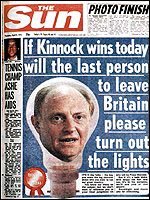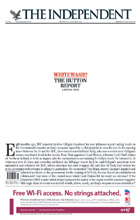I try not to make this blog about local politics - in many ways, this is my escape from my half-life as a councillor, an attempt to make sure I'm still keeping my mind alert to the bigger picture. But exceptions prove rules, so here's a bit of rule-proving...Back in December, I sat down to write some material which could be the basis for the Liberal Democrat finance section of our manifesto for the coming Oxford City Council elections, based on my two-year experience of chairing the Finance Scrutiny Committee. Not all of what I wrote made the final cut. (For reasons of space, rather than because I had taken leave of my senses.) However, I felt it deserved an airing, so posted it over at m'other gaff, where my regular reader can enjoy seeing some of what it is I will be aiming to achieve as the ludicrously-titled 'Portfolio Holder for Better Finances' (actually, I came up with the name).But then I realised that, as most of this blog's readers are Lib Dems (I guess), and will have wide experience of councils across the UK and beyond, you might have some helpful feedback. If so, either post it below, or ping me an e-mail via the link on the right.***Oxford Liberal Democrats' programme for better finances
We believe in Value For Money, delivering the best possible public services for the lowest possible cost.
We will therefore:
* Work to transform Oxford City Council from being a ‘weak’ Council into a ‘good’ Council.
In 2003, the Audit Commission rated Oxford as ‘weak’ in comparison to other councils across the country. Neighbouring Vale of White Horse, run by the Lib Dems, was ranked a ‘Good’ Council, and we intend to ensure this city improves on its current poor standing, the legacy of 24 years of Labour control.
* Spend only what the City Council can afford.
Labour has failed to get a grip on Oxford’s finances, which means tax-payers’ money is being wasted. In 2005, the Labour Council failed to make £540,000 of planned savings – that’s the equivalent of a 5% Council Tax increase!
* Ensure the City Council is delivering Value For Money.
The Lib Dems will establish a rolling programme of zero-based budget reviews of the Council’s services which get to the bottom of how tax-payers’ money is spent, and demand to know if it could be spent better.
* Put in place robust budgets which ensure the Council maintains the buildings it owns.
The Labour City Council has failed to invest in the buildings it owns on behalf of the residents of Oxford. There is now a massive £9.25m backlog of repairs. The Lib Dems will ensure the City Council gives proper regard to the duty of care it has for Oxford’s public realm.
We believe local people are best placed to decide how the City Council spends tax-payers’ money.
We will therefore:
* Devolve budgetary control to the City’s six local Area Committees so that local people are actively involved in deciding how their money is best spent.
In 2001, the Lib Dem-run City Council introduced area committees to give residents a greater say in the running of our city. Now is the time to give the Area Committees the freedom to deliver services according to the priorities of local people.
We believe the City Council must be accountable to the public for the money it spends.
We will therefore:
* Set the City Council clear targets to improve public services, and hold Council officers accountable for delivering these.
The Labour-run City Council has an appalling record of missing its own targets, with increases in (for example) staff sickness and unanswered letters. The Council’s managers must be held directly to account for delivering service improvements.
* Publish an easy-to-understand annual audit, assessed independently either of the Council or Government, which states clearly whether the City Council has met its own Value For Money targets.
There is too much jargon in local government. The Lib Dems will ensure a plain language statement, which sets out for everyone how well (or badly) the Council is doing, is published in the Council’s newsletter and on its website every year.
We believe in Fair Local Taxation, and will campaign to abolish the Council Tax and replace it with a tax based on ability to pay.
We will therefore:
* Keep Council Tax as low as we can.
In 2004-05, Labour voted to increase Council Tax by 4%, but the Council is so inefficient it failed to spend any of this increase! Lib Dems will only vote for increased taxes if we believe they will improve public services, and not to mask the Council’s incompetence.
* Improve the collection of Council Tax so that everybody pays their fair share.
Under Labour, Oxford has one of the worst Council Tax collection rates in the country, and this is unfair on the law-abiding majority.
***(I feel obliged, though, to add a small disclaimer - none of this supersedes our manifesto, Putting People First, which was our official contract with the residents of Oxford. You can read it for yourself by clicking here.)
